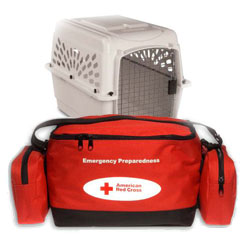 We all have the pictures of Hurricane Katrina's aftermath fresh in our minds and we've heard many heartbreaking stories of pets that had to be left behind. Many people did not evacuate because they could not take their pets with them to the shelters. The end result was the loss of many human lives as well as those of their animal companions. Many more animals were displaced and have yet to be reunited with their owners.
We all have the pictures of Hurricane Katrina's aftermath fresh in our minds and we've heard many heartbreaking stories of pets that had to be left behind. Many people did not evacuate because they could not take their pets with them to the shelters. The end result was the loss of many human lives as well as those of their animal companions. Many more animals were displaced and have yet to be reunited with their owners.
In October 2006, President Bush signed the Pet Evacuation and Transportation Standards Act or PETS Act which amended the Robert T. Stafford Disaster Relief and Emergency Assistance Act. With this law, each state and local government must have in place an emergency plan to evacuate people and their pets. FEMA and the Humane Society of the US have agreed to work together in developing evacuation and sheltering plans for pets.
You may not be exposed to hurricanes, blizzards, tidal waves, earthquakes, tornados, forest fires or floods; however, you can still be susceptible to gas leaks, fires, electrical outages, home flooding, hazardous spills, and water main breaks. It is to your benefit to be prepared for any emergency. How would you handle it? Would you be prepared to get your bird out safely?
Every household should have an evacuation plan in place. The American Veterinary Medical Association has developed a helpful document Saving the Whole Family that contains some helpful information on preparing to evacuate all types of domestic animals including pet birds.
Some disasters provide for warnings days in advance. As soon as the possibility of a pending disaster becomes known start taking steps to protect yourself and your birds. Being prepared in advance will help you to evacuate efficiently, confidently and safely.
Key components of an evacuation plan include:
- Making sure you have enough travel carriers available to transport all of your pets.
- Keeping your carriers under or next to your bird's cages. When time is critical this is much more convenient than having to retrieve them from the garage, basement or attic.
- Pre-labeling each one of your carriers with the following info in indelible ink:
- Bird's name
- Your name and contact info
- Vet's name and contact info
- Preparation of an emergency evacuation kit containing:
- Pet food in airtight container (7 day supply)
- Bottled Water
- Medications
- First Aid Kit
- Proof of ownership papers
- Copy of Vet Records
- Mister for bathing and keeping bird cool during hot weather.
- Hot water bottle for keeping them warm in winter.
- Food dishes & water bottle
- Cleaning supplies & disinfectant
- Cage Cover
- Cage liners
- Toys
- Researching your options for escape routes and emergency accommodations (shelters, pet friendly hotels, friends, relatives) that are far enough away from danger and will accept your pet.
- Having a photo of your bird in your wallet labeled with his band ID number for identification purposes just in case you have to leave him behind at a pet shelter.
- Affix a pet evacuation sticker (available from the humane society) on your front door or on the front door of your refrigerator indicating the number of pets residing in your household. Provide an emergency contact number in case the animals must be removed without your knowledge. Without this, rescuers may not be aware that there are animals in the home.
- If you are going on vacation and someone is watching your parrot companion, familiarize them with the plan and the emergency kit.
In the Case of Emergency...
- Stay calm.
- Transfer birds to their carriers.
- Call to make emergency shelter arrangements/reservations.
- Leave immediately with your pets when ordered to evacuate or sooner if possible.
- Load your car
- Proceed to your pre-planned evacuation destination.



















































































































































Comments powered by CComment